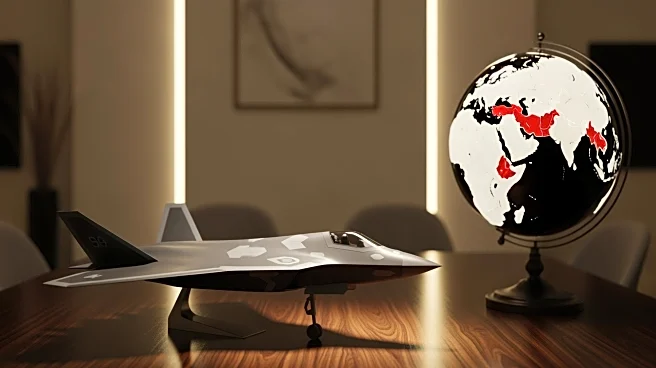What's Happening?
President Trump announced his consideration of a deal to supply Saudi Arabia with F-35 stealth fighter jets. This potential agreement is part of broader diplomatic efforts to encourage Saudi Arabia to join
the Abraham Accords, a series of normalization agreements between Israel and several Arab nations. The announcement comes ahead of a planned meeting between President Trump and Saudi Crown Prince Mohammed bin Salman at the White House, where they are expected to discuss economic and defense agreements. The F-35 deal is seen as a strategic move to strengthen U.S.-Saudi relations and promote regional stability through expanded alliances.
Why It's Important?
The potential sale of F-35 jets to Saudi Arabia could significantly impact the balance of power in the Middle East. It may enhance Saudi Arabia's military capabilities, potentially altering regional dynamics and affecting Israel's qualitative military edge. The move aligns with U.S. foreign policy goals to foster peace and cooperation in the region through the Abraham Accords. If successful, Saudi Arabia's inclusion in the accords could lead to increased economic and diplomatic collaboration, benefiting U.S. interests in the Middle East. However, it may also raise concerns among other regional players about shifting alliances and military capabilities.
What's Next?
The upcoming meeting between President Trump and Crown Prince Mohammed bin Salman at the White House will be crucial in determining the future of the F-35 deal and Saudi Arabia's participation in the Abraham Accords. The discussions are expected to cover various aspects of economic and defense cooperation, potentially leading to formal agreements. The outcome of these talks could influence U.S. foreign policy in the region and set the stage for further diplomatic engagements. Observers will be watching for reactions from other Middle Eastern countries and stakeholders, as the implications of these agreements unfold.
Beyond the Headlines
The strategic triad reforms, including the potential F-35 sale, reflect broader shifts in U.S. foreign policy aimed at strengthening alliances and promoting stability in the Middle East. These developments may have long-term implications for regional geopolitics, particularly in terms of military balance and diplomatic relations. The focus on expanding the Abraham Accords highlights the U.S. commitment to fostering peace through economic and defense partnerships, which could lead to new opportunities for collaboration in areas such as technology and security.









